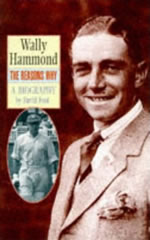Wally Hammond: The Reasons Why
David Taylor |Published: 1996
Pages: 284
Author: Foot, David
Publisher: Robson Books
Rating: 4 stars

The veteran writer and journalist David Foot is based in the south-west of England, and specialises in county cricket in that area. His books include a biography of Somerset batsman Harold Gimblett, a history of Somerset cricket since World War Two, and this excellent work, the story of the Gloucestershire all-rounder who even today would feature in most people’s all-time England Test XI.
Like the fragile Gimblett, Hammond was undoubtedly a flawed character. Of course he was loved by spectators, to whom he gave countless hours of rich entertainment – his cover driving in particular was without parallel and as many sore fingered fielders could attest, he hit the ball murderously hard (one of his favourite tricks was to sting the hands of each fielder saving one on the off side, to make them reluctant to attempt further saves). He could bowl as fast as anyone in the country when the mood took him – he was incensed when the amateur Charles Dacre attempted to stand up to him – and he was a peerless slip fielder off fast or slow bowling.
But while Hammond the man was admired and, on the whole, respected by his fellow players he was also feared, mistrusted and in some cases loathed. Foot makes no bones about this. While the many triumphs are faithfully recorded, notably his record-breaking series in Australia in 1928-29 and his stupendous 240 against the same opponents at Lord’s in 1938, within changing rooms his moodswings were notorious. He lost his father to the Great War as a child, perhaps deprived as a result of a male role model in his life, although his mother was devoted to him. He went on to be notoriously promiscous and sometimes scanned cricket grounds with his binoculars, seeking out a possible new conquest. To his team-mates he was often abrupt, uncommunicative and unhelpful.
Hammond might have played earlier than he did. At 17 he was identified as a prospect and played a few games for Gloucestershire before Kent’s Lord Harris, noting that he had been born at Dover, insisted that he spend time qualifying. Thereafter it was said that he tried a little harder against Kent – even then he was a man to bear a grudge.
Later in his career Hammond was beset by doubts and insecurities. His marriage, unsurprisingly, was in difficulties. He was undoubtedly resentful of Don Bradman’s ascendancy in the 1930s, taking his crown as the world’s best batsman barely a year after Hammond had first laid claim to the title. He was often short of money and took a job as a car salesman with minimal knowledge of the business. Always class-conscious, he made the decision in 1938 to play as an amateur in order to captain England, but that simply led to more money worries. He lost a few good years to the war of 1939-45, but when cricket resumed was no longer fit enough to go on, although he was persuaded to take a team to Australia in 1946-47, where he failed to reach 50 in four Tests.
And that, apart from an ill-advised comeback match in 1951, was it. He remarried and emigrated to South Africa, becoming a father in middle age. He seems to have mellowed a little in his later years, and evidently visiting teams to South Africa found him congenial company, but a lifetime of excess led to a fatal heart attack at 62. The family was left impoverished and a fund was started back in England to raise money for them.
The assessment of Hammond’s character is not all negative – there are various accounts of random acts of kindness and consideration – but without doubt he was a difficult man to get to know, and perhaps harder still to warm to. Still, this is an excellent, and not unsympathetic, account of the life of a true great of the game.






Leave a comment